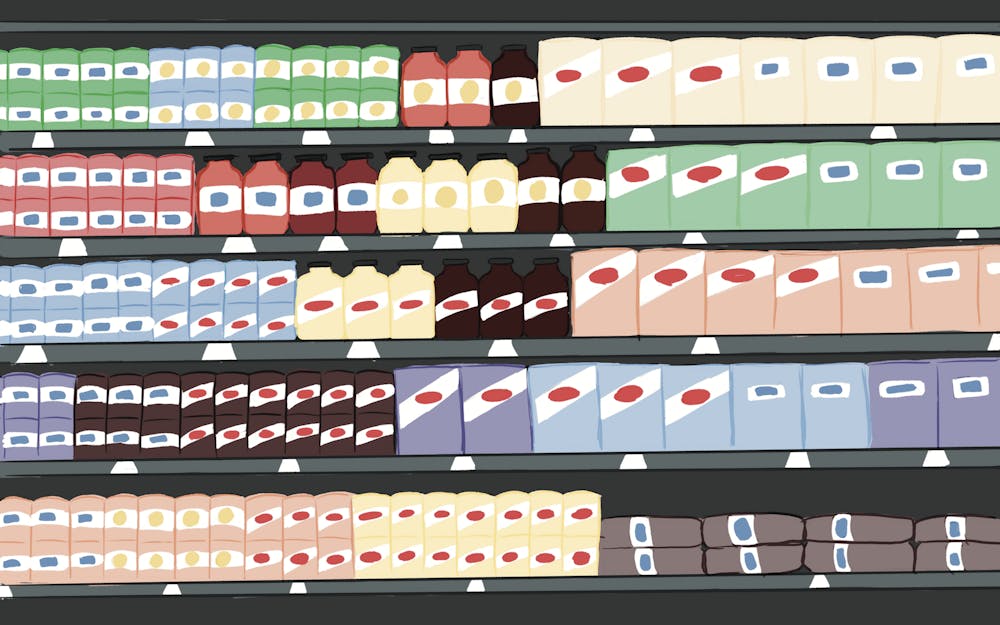When one thinks of grocery stores, sprawling, packed aisles may come to mind. Dozens of yard-long shelves, each devoted to a single product - a myriad of choices ready to satisfy every consumer desire possible. This could be a great display of how capitalism in America is purported to work: a characterization of the free market, as competition between hundreds of brands helps regulate prices, quality, working conditions,and supply and demand. Unfortunately, this abundance isn’t what it seems — and there are more consequences than meets the eye.
Investigations by the American Economic Liberties Project and The Guardian reveal that American grocery stories are dominated by just a handful of large conglomerates, whose offerings strategically range categories and price points. The Guardian concluded that for 85% of the groceries they analyzed, four or less entities controlled at least 40% of the market share. For nearly a third, the top firms controlled more than 75%.
Take for example, soft drinks, where an overwhelming 92.9% of the market is controlled by just three companies: Coca-Cola, at 42.4%; Pepsi Co, at 27.4%; and Keurig Dr. Pepper, at 23.1%. With such a large stronghold on the market and limited competition, just a few corporations can manipulate prices of these products upward, because consumers have few, if any, widely available alternatives to turn to.
This also creates a hostile environment for independent entrepreneurs to break into the market, as methods for production and distribution are commandeered by just three powerful firms. Further, these brands frequently acquire smaller ones to eliminate competition or further increase their offerings and therefore their share of the industry. Coca-Cola, for example, has acquired brands such as Body Armor, Topo Chico and Vitamin Water.
In fact, college students’ own favorite, Natural Light, is also a case of this illusion. Natural Light is offered by corporation Anheuser-Busch, whose products also include Bud Light, Budweiser, Busch, Corona, Goose Island, Michelob, Stella Artois and more, for a total of 71 brands. At a range of different price points, Anheuser-Busch commands the American beer market. In addition to prices and development, this also complicates working conditions.
The struggle for workers’ rights under big companies is well-documented, from early incidents in industrialization like the Triangle Shirtwaist Company factory fire, to more recent reports from The New York Times and the U.S. Department of Labor's exposing Amazon’s payroll errors and dangerous warehouse conditions. Of course, the drink and food industries are not precluded from this trend of corporate violence.
In December 2023, 5,000 Teamsters working at Anheuser-Busch agreed to strike in February 2024 if negotiations for a new contract weren’t satisfactory — covering issues like health care, wages and job security — after the company suddenly walked away from talks. Through striking, workers can regain their power in bargaining since their absence from production directly impacts the company’s ability to supply product, therefore hindering their profits.
However, workers aren’t the only ones able to hit them where it hurts: consumers can also pressure corporations by boycotting their products. By leveraging our buying power and demonstrating this coordination with workers, companies will be more inclined to improve conditions to not incur irreparable damage to their revenue streams.
Moreover, you don’t need a strike to take a stand. We can all adopt more conscious shopping practices into our lives by learning of the corporate structures that permeate grocery stores everywhere, and making more informed decisions about the products we buy — if not to ally with workers all over the country, then to save yourself money. One expert estimates that these monopolies cost American households an added $5,000 a year. By acknowledging them, the damage they do to workers and consumers, and redirecting our purchases elsewhere, we can cultivate better wages, working conditions, and prices for us all.
Ellie Willhite (she/her) is a freshman pursuing her BFA in cinematic arts with minors in sociology and Korean.






